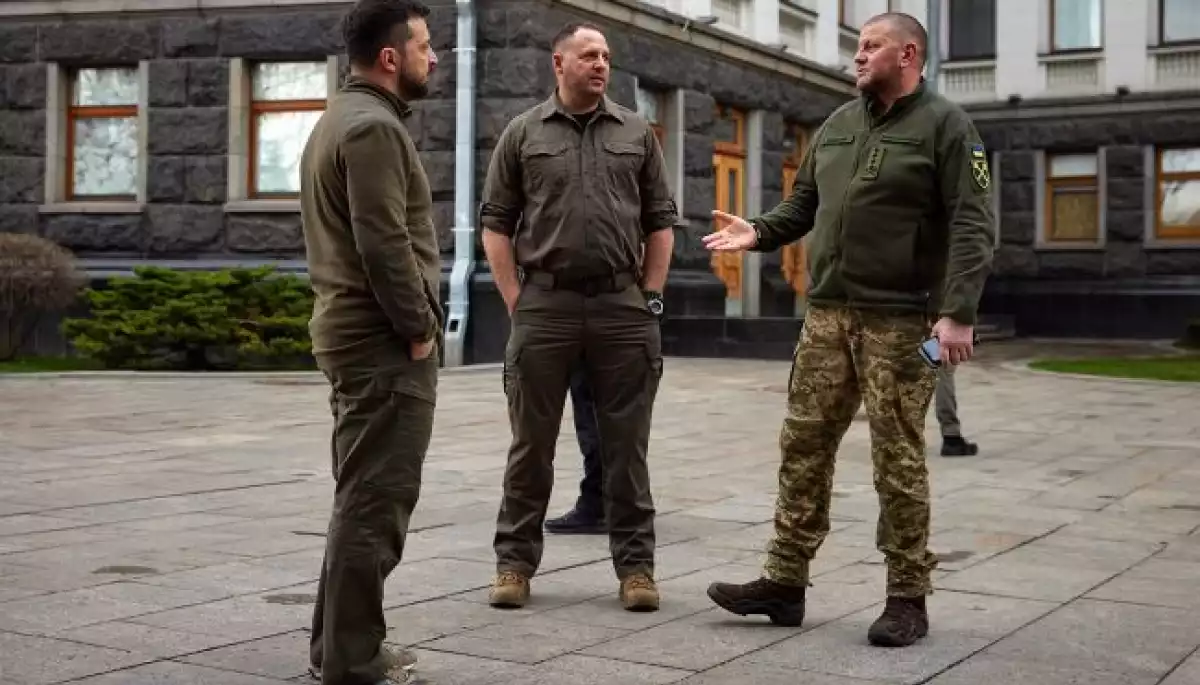Українською читайте тут.
Let us recall the chain of events. On January 29, at 6:20 p.m., a post was published on the Telegram channel of Boryslav Bereza, a former member of the Verkhovna Rada and a member of the Ukrop parliamentary association. Bereza wrote that, according to two of his sources, President Zelenskyy had fired Commander-in-Chief Zaluzhnyi.
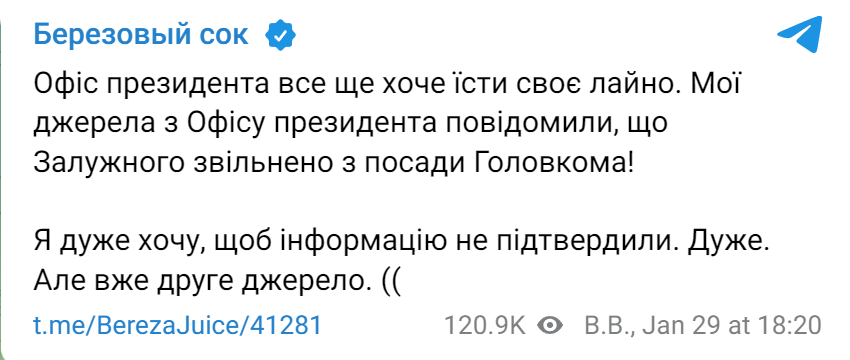
Bereza’s post quickly took on a life of its own. It circulated widely in discussion groups across various Telegram channels, notably within the Ukraina 24/7 chat, which boasts over 700,000 subscribers. The post was soon echoed by other Telegram channels. Within just ten minutes, it was featured on Vasyl Pekhnio’s channel (51,000 subscribers), known for commenting on frontline events via the Fabryka Novyn YouTube channel. Fifteen minutes later, the news of Zaluzhnyi’s dismissal — treated as a fact, not mere speculation — was broadcast on the Trukha-Ukraina Telegram channel (2.6 million subscribers), of course, referring to their own sources. Merely a minute later, lawyer Andriy Smoliy (174,000 followers) discussed the issue on his Telegram channel, this time without mentioning Bereza. Smoliy’s post mentioned that the “information was sourced from several places”, yet he emphasized the need for official verification.
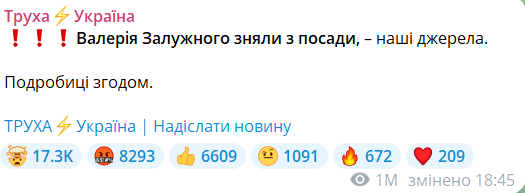
It quickly became evident that it only took a few minutes for the same news to surface on Russian Telegram channels. One of the earliest to report was a Russian propagandist, Ruslan Ostashko, who has a following of 360,000, at 6:51 p.m.
After 7 p.m., other details of the alleged dismissal appeared: at 7:16 p.m., journalist Roman Tsymbalyuk wrote on his Telegram channel that “we have a new commander-in-chief, Kyrylo Budanov,” without specifying the source of the information, and also presenting it as a confirmed fact. Later, he wrote that he had removed the post, claiming instead that the decision had been changed at the last minute due to its sensitivity.
Simultaneously with Tsymbaliuk, Oleksiy Honcharenko, a member of the European Solidarity party, wrote that two sources confirmed Zaluzhnyi’s dismissal, though he added that he hoped the information proved to be false.
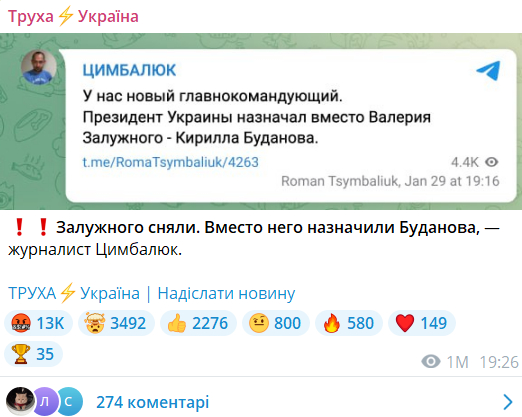
This is where the backstory ends, and the story proper begins. Censor.net was the first Ukrainian media outlet to report the news of Zaluzhnyi’s dismissal (at 7:21 p.m.), citing its own sources. It referred to Kyrylo Budanov as a candidate for the post of Commander-in-Chief, said that the decree had not yet been signed, and said that consultations were ongoing “with Western partners.”
After that, all of the most influential Ukrainian media outlets published the news almost simultaneously, all citing their own sources.
Interfax-Ukraine, citing a single source “close to the country’s military and political leadership,” reported on Zaluzhnyi’s “possible” dismissal. A minute after that, Livyi Bereh published a story, which was subsequently updated and later changed its headline from “Zelenskyy Dismissed Zaluzhnyi From the Post of Commander-in-Chief of the Armed Forces” to a less unambiguous one. Hromadske had an interesting news item with the headline “Zaluzhnyi’s Alleged Dismissal Discussed Online”, and it was probably one of the few news items that did not cite its own sources. However, the news itself stated that in response to an inquiry to the General Staff, Hromadske journalists received a response that they did not “comment on rumors.” A minute later, at 7:36 p.m., the news was published on Ukrainska Pravda, “President’s Office Considering Zaluzhnyi’s Resignation. No Decree Yet — Sources”.
At this point, what could be called the Ministry of Defense’s statement finally emerged, if not for the vagueness of the wording and ambiguity of the statement.
At 7:41 p.m., which is almost an hour and a half after the first reports, the Ministry posted the following on social media, “Dear journalists, we are answering all of you at once: no, this is not true.”

That is, first, they do comment on the “rumors”. Secondly, they comment in a way that further obscures the situation. At that time, the media had already published information with references to Telegram channels that not only Zaluzhnyi was being fired but that a whole range of senior officials was to be replaced, some of whom were supposed to be promoted to other positions. This included Defense Minister Rustem Umerov. So many assumed that the message from the Defense Ministry was saying that the information about Umerov’s dismissal was false, not Zaluzhnyi’s.
Eventually, Ukrainska Pravda received a comment from Serhiy Nikiforov, the president’s press secretary, which was again quite ambiguous: he said that the president had not dismissed the Commander-in-Chief. But this answer could also lead to the conclusion that Zaluzhnyi had resigned of his own free will, as some Telegram channels had reported before.
At the very moment when Ukrainska Pravda released the news, Dzerkalo Tyzhnia published an article that already had a headline saying that the Defense Ministry had refuted the information about Zaluzhnyi’s dismissal. However, the text itself stated that the general was “packing his things in his office,” citing Dzherkalo Tyzhnia’s sources. The news also stated that Zaluzhnyi was offered another position in the National Security and Defense Council, Kyrylo Budanov was offered the post of Commander-in-Chief, and Syrskyi was offered to head the General Staff. Around midnight, Dzerkalo Tyzhnia published a story saying that Zelenskyy had met with Zaluzhnyi, the president had offered him to resign of his own free will, but the Commander-in-Chief refused.
At 8:18 p.m., President Zelenskyy delivered his traditional address, which many expected to be particularly tense this time, and yet it made no mention of Zaluzhnyi or any personnel decisions at all.
So, during the evening of December 29, rumors, questions, conspiracy theories, excuses and accusations proliferated on social media. For a while, Zaluzhnyi was trending on Twitter. Journalists wrote about how they tried to verify the information, and an indicative case is the conversation of Iryna Romaliyska, a journalist with Current Time, who wanted to get a comment from the adviser to the head of the President’s Office, Serhiy Leshchenko, and the latter tried to avoid answering the question (and succeeded).
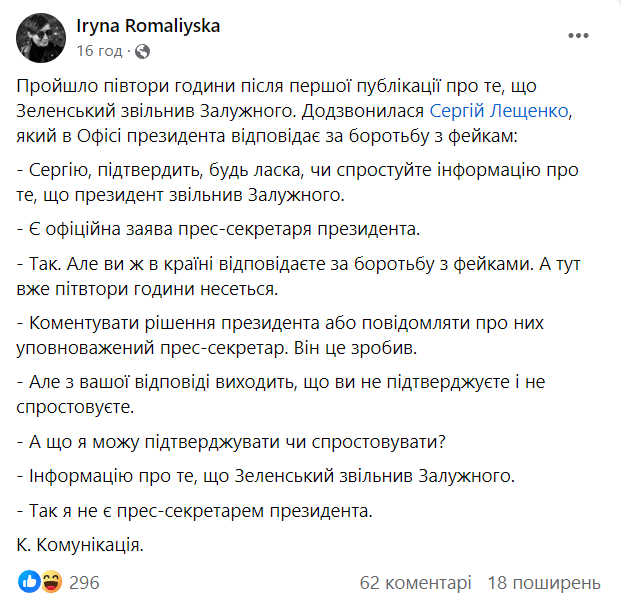
All this time, anonymous Telegram channels were also playing a game of “guess what we know, but we won’t tell you”. Some of them kept an unexpected silence. For example, Vertikal and Kartochnyi Ofis, which are close to the President’s Office, and which announced some “fateful” decisions of the authorities in the coming days on January 22 and 23, but remained silent throughout January 29, and remain so to this day. At 7:00 p.m., Vertikal simply wrote, “Wait before you repost bullshit.” The only funny reaction was from the Dzhoker Telegram channel, which could not decide whether the possible resignation of Zaluzhnyi was a “betrayal” or a “victory.” At first, Dzhoker wrote, “I can’t believe it,” then “don’t create an idol for yourself,” then he wrote that Zaluzhnyi had been fired, then he began to insist that he had quit on his own, citing “his own sources,” of course. Now, if anonymous Telegram channels publish anything about the Commander-in-Chief, they do so exclusively by citing Western media.
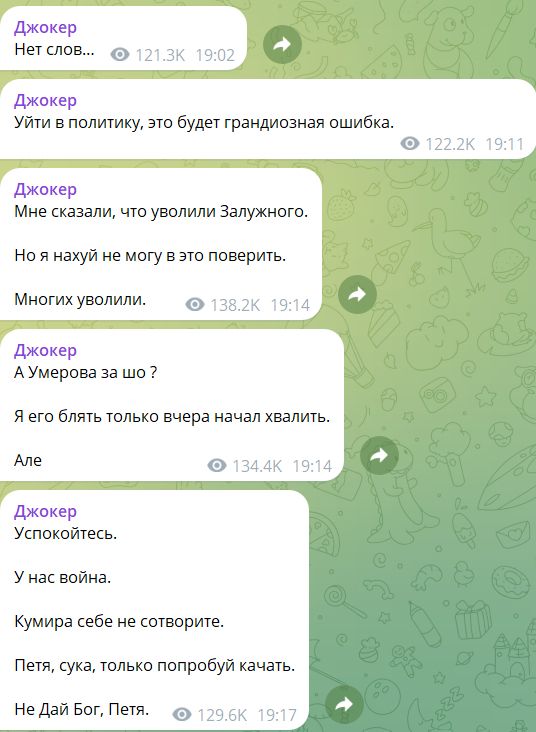
At this point, two days have passed since the information about Zaluzhnyi’s possible resignation emerged. During this time, hundreds, if not thousands, of articles have been published in both Ukrainian and Western media. All of them have tried to explain what is happening since it is obvious to not only journalists but anyone that something is happening.
There is much interesting to these publications, such as the fact that on the evening of January 29, before Nikiforov and the Ministry of Defense’s statements, the BBC received a comment from Ilarion Pavliuk, the head of the Defense Ministry’s press and information department, who denied Zaluzhnyi’s resignation. However, the story with his denial was published only the next day, and the news of the possible resignation of the Commander-in-Chief was not published on the BBC on January 29 at all. On January 30 and 31, foreign media, citing their own sources, reported that Zelenskyy and Zaluzhnyi had had a conversation, that the Commander-in-Chief had been asked to resign, but that both Syrskyi and Budanov refused [to take his position], forcing the president to “back down.” In other words, they actually confirmed what the Ukrainian media had been reporting. The Washington Post wrote that Zaluzhnyi rejected the president’s proposals for a new position and would soon resign himself. The Financial Times said that it was the president who insisted on his resignation. Most Western media agree that the main reason for the conflict is the threat of political competition from the general and the large-scale mobilization that the Commander-in-Chief insists on and the President opposes. There is also talk of the president’s possible desire to hold the Commander-in-Chief responsible for the failure of the counteroffensive. Western publications also state that this conflict is splitting Ukrainian unity and is bad for the prospects of Western support for Ukraine. Russia is rejoicing.

In the meantime, there has been no official statement, explanation, or appeal to Ukrainian society from the government over these two days. There is a huge staff of advisors, speakers, freelance media advisors, numerous StratComs, government communications experts, press services, consolidated and separate ones. And all these people are silent. Or they say things like one of the Presidential Office’s advisors, Dmytro Lytvyn. First, he criticized journalists on Facebook for allegedly demanding that official speakers comment on “information from anonymous Telegram channels” — although many of the messages about Zaluzhnyi’s dismissal on the social network were not anonymous at all. The first message appeared on Bereza’s Telegram channel (not anonymous), and 15 minutes later, on the very same Trukha Telegram channel, which the PO itself considers a legitimate media outlet with transparent ownership, PO’s advisors give comments to the channel, etc. Verifying information from non-anonymous sources and those legitimized by the authorities — official sources — is a direct responsibility of journalists. And that’s exactly what they did. In addition, the President’s Office persistently invites Telegram channel representatives to press conferences and off-the-record meetings, thus putting them on a par with the media. Even calling them real fighters of the information front, why is it surprising that journalists pay attention to their messages? Then, Lytvyn writes that “some people have been playing politics and information games too much,” forgetting that the enemy is on the doorstep.
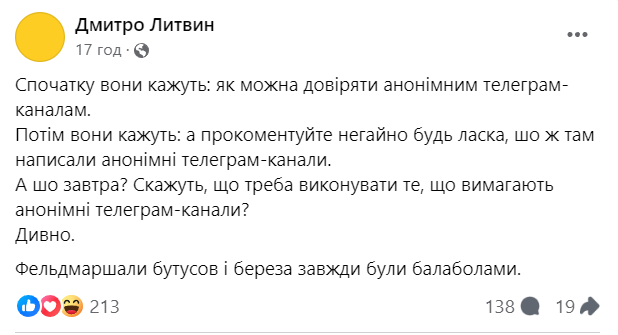
An interesting observation, but who exactly is playing these games?
It can be debated at length whether journalists can publish stories based solely on the accounts of sources they know but who are not named in the story. After all, in this case, the sources are not responsible for the published information, and all responsibility lies with the journalist. But didn’t the authorities actually start playing this game in the “Zaluzhnyi case”, with all the comments being made exclusively “without names”? If the media had refused to publish reports with references to unnamed sources in this situation, as well as in numerous other crises or matters sensitive to the government, how would they have managed to deliver important information to the public? Because Zaluzhnyi’s case is not a bug but a consistent approach.
More recently, and not everyone has forgotten, Ukrainska Pravda’s sources in the General Staff themselves reported the downing of the IL-76 plane to journalists — and again, these sources wished to remain anonymous. Later, they simply pretended that they had nothing to do with this information, and as of now, it is still unclear whether the Russian plane was shot down by the Ukrainian Armed Forces or not. All that is being discussed is whether there were Ukrainian prisoners of war on board.
Let’s recall another resignation, one from the pre-war era. Back then, sources, who were even later identified, blatantly lied to journalists about the resignation of the head of the President’s Office, Andriy Bohdan. Kyrylo Tymoshenko, who circulated the document, later said that he had simply downloaded the statement from a media outlet and sent it to all journalists in response, supposedly as a joke. But Babel then claimed that it had received the statement from Tymoshenko before other media published it. Judging by the fact that Bohdan resigned six months after this story, we can understand that there was a resignation letter (as confirmed by Bohdan himself), but at the last moment, someone changed their mind, and the PO decided to blame the “journalists the government doesn’t need” for the leak.
The situation has not improved during the war, but judging by recent cases, it has deteriorated significantly.
First, Zaluzhnyi’s case demonstrates the lack of a plan B when plan A didn’t work, that is, of crisis communication, when you need to quickly explain what is happening, not make something up on the fly and stall for time in the hope that the tension subsides on its own, people lose attention, and everything somehow goes back to normal.
Secondly, the government itself, as has been proven time and again, legitimizes anonymous Telegram channels and tries to use them to communicate with society. It is easier to “leak” the necessary information and easier to deny it later.
Thirdly, all those who have to communicate — both with journalists and with society — are now fulfilling a completely different order. They are building communications not in the interests of society but in the leadership’s interests so as not to harm the latter. That’s why they avoid talking about things that they don’t want to explain, that are dangerous for the political career of their superiors, and that require them to take responsibility. Rather than actually informing or explaining, they rely on political logic.
Last but not the least. Journalist and military officer Vakhtanh Kipiani called the events in the media space regarding Zaluzhnyi’s resignation a “communication disaster” and noted that the army did not deserve this. It’s hard to disagree. Neither the army nor society deserved it.

